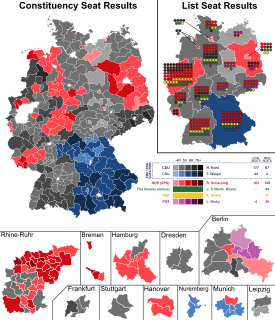Related Research Articles

The Free Democratic Party is a liberal political party in Germany.

Helmut Josef Michael Kohl was a German politician who served as Chancellor of Germany from 1982 to 1998 and Leader of the Christian Democratic Union (CDU) from 1973 to 1998. Kohl's 16-year tenure is the longest of any German chancellor since Otto von Bismarck, and oversaw the end of the Cold War, the German reunification and the creation of the European Union (EU).

Karl Carstens was a German politician. He served as the president of West Germany from 1979 to 1984.

Walter Scheel was a German statesman. A member of the Free Democratic Party of Germany (FDP), he first served in government as the Federal Minister of Economic Cooperation and Development from 1961 to 1966 and later as President of Germany from 1974 to 1979. He led the FDP from 1968 to 1974.

Bernhard Vogel is a German politician of the Christian Democratic Union (CDU). He was the 4th Minister President of Rhineland-Palatinate from 1976 to 1988 and the 2nd Minister President of Thuringia from 1992 to 2003. He is the only person to have been head of two different German federal states and is the longest-governing Minister President of Germany. He served as the 28th and 40th President of the Bundesrat in 1976/77 and 1987/88.

Herbert Richard Wehner was a German politician. A former member of the Communist Party, he joined the Social Democrats (SPD) after World War II. He served as Federal Minister of Intra-German Relations from 1966 to 1969 and thereafter as chairman of the SPD parliamentary group in the Bundestag until 1983.

Holger Börner was a German politician of the SPD.

Federal elections were held in Germany on 16 October 1994 to elect the members of the 13th Bundestag. The CDU/CSU alliance led by Helmut Kohl remained the largest faction in parliament, with Kohl remaining Chancellor in a narrowly re-elected coalition with the FDP. This elected Bundestag was largest in history until 2017, numbering 672 members.

Federal elections were held in West Germany on 19 November 1972 to elect the members of the 7th Bundestag. In the first snap elections since the resumption of democratic elections in 1949, the Social Democratic Party became the largest party in parliament for the first time since 1930, winning 230 of the 496 seats. The coalition with the Free Democratic Party was resumed.

Federal elections were held in West Germany on 28 September 1969 to elect the members of the 6th Bundestag. The CDU/CSU remained the largest faction and the Social Democratic Party remained the largest single party in the Bundestag, winning 237 of the 518 seats. After the election, the SPD formed a coalition with the Free Democratic Party and SPD leader Willy Brandt became Chancellor.

Rainer Candidus Barzel was a German politician of the Christian Democratic Union (CDU). He served as the 8th President of the Bundestag from 1983 to 1984.

Otto Friedrich Wilhelm Freiherr von der Wenge Graf Lambsdorff, known as Otto Graf Lambsdorff, was a German politician of the Free Democratic Party (FDP).

Kurt Beck is a German politician of the Social Democratic Party (SPD), who served as the 7th Minister President of Rhineland-Palatinate from 1994 to 2013 and as the 55th President of the Bundesrat in 2000/01. In May 2006, he succeeded Matthias Platzeck as chairman of the German Social Democratic Party (SPD). He resigned from that post in September 2008.

Rainer Brüderle is a German politician and member of the Free Democratic Party (FDP). He served as Minister of Economics and Transport of Rhineland-Palatinate from 1987–1998. On 28 October 2009, he was appointed Federal Minister for Economics and Technology in the second cabinet of Chancellor Angela Merkel. Following his election in May 2011 as chairman of his party's parliamentary group, Brüderle resigned as Federal Minister for Economic Affairs and Technology.

Tobias Lindner is a German economist and politician of Bündnis 90/Die Grünen who has been serving as member of the Bundestag since 2011, representing Germersheim, Rhineland-Palatinate. Since December 8, 2021, he has been Minister of State at the Federal Foreign Office.

Michael Georg Link is a German politician of the Free Democratic Party (FPD) who has served a member of the Bundestag from 2005 to 2013 and again since 2017. In addition to his parliamentary work, he has been serving as the Coordinator of Transatlantic Cooperation at the Federal Foreign Office in the coalition government of Chancellor Olaf Scholz since 2022.

Xaver Jung is a German politician of the Christian Democratic Union (CDU) and former member of the German Bundestag.
Werner Danz was a German politician of the Free Democratic Party (FDP) and former member of the German Bundestag.

Volker Wissing is a German lawyer, former judge and politician of the liberal Free Democratic Party (FDP) who has been serving as the party's General Secretary since 2020, and as Minister for Transport in the federal government under Chancellor Olaf Scholz since 2021. He previously was the Deputy Minister-President of Rhineland-Palatinate in the state government under Minister-President Malu Dreyer from 2016 to 2021 and a member of the German Parliament from 2004 to 2013.
References
- ↑ "Die Mitglieder des Deutschen Bundestages – 1.-13. Wahlperiode: Alphabetisches Gesamtverzeichnis" [The members of the German Bundestag – 1st – 13th term of office: Alphabetical complete index]. webarchiv.bundestag.de (in German). Deutscher Bundestag, Verwaltung WD 3 / ZI 5. 2 February 1998. Retrieved 21 May 2020.